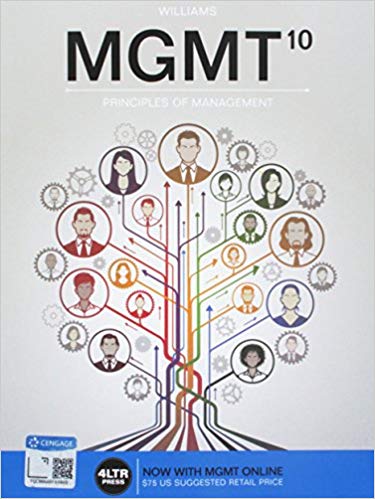Instruction Manual for MGMT 10th Edition by Chuck Williams ISBN 1337116750 9781337116756
$70.00 Original price was: $70.00.$35.00Current price is: $35.00.
Instant download (Instruction Manual) MGMT 10th Edition after payment
Instruction Manual for MGMT 10th Edition by Chuck Williams – Ebook PDF Instant Download/Delivery: 1337116750, 9781337116756
Full download MGMT 10th edition after payment

Product details:
ISBN 10: 1337116750
ISBN 13: 9781337116756
Author: Chuck Williams
Learn your Principles of Management Course YOUR Way with MGMT! MGMT’s easy-reference, paperback textbook presents course content through visually-engaging chapters as well as Chapter Review Cards that consolidate the best review material into a ready-made study tool. With the textbook or on its own, MGMT Online allows easy exploration of MGMT anywhere, anytime – including on your device! Collect your notes and create StudyBits‚Ñ¢ from interactive content as you go to remember what’s important. Then, either use preset study resources, or personalize the product through easy-to-use tags and filters to prioritize your study time. Make and review flashcards, review related content, and track your progress with Concept Tracker, all in one place and at an affordable price!
MGMT 10th Table of contents:
Part 1. Introduction to Management
Chapter 1. Management
-
1-1. Management Is …
-
1-2. Management Functions
-
1-2a. Planning
-
1-2b. Organizing
-
1-2c. Leading
-
1-2d. Controlling
-
-
1-3. Kinds of Managers
-
1-3a. Top Managers
-
1-3b. Middle Managers
-
1-3c. First-Line Managers
-
1-3d. Team Leaders
-
-
1-4. Managerial Roles
-
1-4a. Interpersonal Roles
-
1-4b. Informational Roles
-
1-4c. Decisional Roles
-
-
1-5. What Companies Look for in Managers
-
1-6. Mistakes Managers Make
-
1-7. The Transition to Management: The First Year
-
1-8. Competitive Advantage through People
Chapter Review 1.
-
Learning Outcomes/Key Terms
Chapter 2. The History of Management
-
2-1. The Origins of Management
-
2-1a. Management Ideas and Practices throughout History
-
2-1b. Why We Need Managers Today
-
-
2-2. Scientific Management
-
2-2a. Father of Scientific Management: Frederick W. Taylor
-
2-2b. Motion Studies: Frank and Lillian Gilbreth
-
2-2c. Charts: Henry Gantt
-
-
2-3. Bureaucratic and Administrative Management
-
2-3a. Bureaucratic Management: Max Weber
-
2-3b. Administrative Management: Henri Fayol
-
-
2-4. Human Relations Management
-
2-4a. Constructive Conflict and Coordination: Mary Parker Follett
-
2-4b. Hawthorne Studies: Elton Mayo
-
2-4c. Cooperation and Acceptance of Authority: Chester Barnard
-
-
2-5. Operations, Information, Systems, and Contingency Management
-
2-5a. Operations Management
-
2-5b. Information Management
-
2-5c. Systems Management
-
2-5d. Contingency Management
-
Chapter Review 2.
-
Learning Outcomes/Key Terms
Chapter 3. Organizational Environments and Cultures
-
3-1. Changing Environments
-
3-1a. Environmental Change
-
3-1b. Environmental Complexity
-
3-1c. Resource Scarcity
-
3-1d. Uncertainty
-
-
3-2. General Environment
-
3-2a. Economy
-
3-2b. Technological Component
-
3-2c. Sociocultural Component
-
3-2d. Political/Legal Component
-
-
3-3. Specific Environment
-
3-3a. Customer Component
-
3-3b. Competitor Component
-
3-3c. Supplier Component
-
3-3d. Industry Regulation Component
-
3-3e. Advocacy Groups
-
-
3-4. Making Sense of Changing Environments
-
3-4a. Environmental Scanning
-
3-4b. Interpreting Environmental Factors
-
3-4c. Acting on Threats and Opportunities
-
-
3-5. Organizational Cultures: Creation, Success, and Change
-
3-5a. Creation and Maintenance of Organizational Cultures
-
3-5b. Successful Organizational Cultures
-
3-5c. Changing Organizational Cultures
-
Chapter Review 3.
-
Learning Outcomes/Key Terms
Chapter 4. Ethics and Social Responsibility
-
4-1. Workplace Deviance
-
4-2. U.S. Sentencing Commission Guidelines for Organizations
-
4-2a. Who, What, and Why?
-
4-2b. Determining the Punishment
-
-
4-3. Influences on Ethical Decision Making
-
4-3a. Ethical Intensity of the Decision
-
4-3b. Moral Development
-
4-3c. Principles of Ethical Decision Making
-
-
4-4. Practical Steps to Ethical Decision Making
-
4-4a. Selecting and Hiring Ethical Employees
-
4-4b. Codes of Ethics
-
4-4c. Ethics Training
-
4-4d. Ethical Climate
-
-
4-5. To Whom Are Organizations Socially Responsible?
-
4-6. For What Are Organizations Socially Responsible?
-
4-7. Responses to Demands for Social Responsibility
-
4-8. Social Responsibility and Economic Performance
Chapter Review 4.
-
Learning Outcomes/Key Terms
People also search MGMT 10th:
mgmt 10
mgmt 11
mgmt 10 williams pdf free
mgmt principles of management 11th edition pdf
mgmt facts
mgmt 12
Tags: Chuck Williams, MGMT


